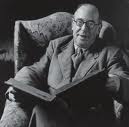
The Theological Nature of the New Testament

Today in my class, "Doctrine of God", I was trying to communicate with students how the New Testament documents are fundamentally, inherently, and inextricably theological documents. That is, we don't go to the New Testament, pull out (non-theological) "data", and then try to "get to" theological conclusions. Rather, the New Testament documents are already theologically-rich and full, and in fact there was already an "apostolic theology" in existence before the emergence of the New Testament that actually gave rise to the New Testament documents. One student in the class (thanks Jace) took this picture.
To be clear, option (1) is a bit anemic and inadequate, while option (2) is more sound, on my view.
- Details
- Category: Recommended Reading Recommended Reading
- Published: 14 September 2011 14 September 2011
- Hits: 4194 4194
C.S. Lewis' Learning in War-Time

An essay I have read over and over is "Learning in War-Time" by C.S. Lewis. To my mind it is one of the best (brief) statements on the nature of learning I know of. See the pdf here.
- Details
- Category: Recommended Reading Recommended Reading
- Published: 22 August 2011 22 August 2011
- Hits: 8763 8763
England, C.S. Lewis, and the Sad Fulfillment of the Abolition of Man

Our family is enjoying a mini-sabbatical of sorts in Cambridge, England, where I am enjoying the wonderful opportunity to study at Tyndale House, see old friends, make new friends, and enjoy some time in the U.K. Having enjoyed a wonderful sabbatical here in 2010, it is a joy to be back.
Sadly, within a few days of our arrival, there were riots in the Tottenham area of London. We prayed for the situation in church, and now similar riots--including various violent acts, looting, etc., have broken out in numerous places in England. Even here in Cambridge, it appears that a gang of people had gathered one evening and were headed to the Grafton Centre (a shopping mall/area) in Cambridge, before police intercepted the effort and apprended (at least some) of the apparently would-be looters/rioters.
The last time we were here (spring 2010), there was talk about Britain being "broken"--and this talk came from, if I remember correctly, the Conservative party here, and its leader (now Prime Minister) David Cameron. I have no doubt that Britain--like virtually any modern nation-state--is "broken". As a limited-government kind of American, I have my differences with the statist and welfare-state system of any modern nation-state who chooses that economic/social/political path (the UK or otherwise). The welfare-state virtually must--by definition--produce an entitlement mentality, and as wonderful as the UK is, it is nigh impossible to avoid an entitlement mentality when one is told repeatedly that shelter, food, drink, education, health-care, employment, etc., are all "rights" that one is entitled do.
But I suppose that the "brokenness" of the UK--as well as the "brokenness" of the modern world more generally--runs deeper than simply a false view of entitlement. I keep waiting for folks to turn to C.S. Lewis' classic work, The Abolition of Man. To my mind The Abolition of Man was one of Lewis' most prescient works, and its radical nature may still not be appreciated. Lewis was concerned about the power of one generation to shape the next generation, and the way in which one generation could--even if this was not their explicit goal--"abolish" man over time. That is, through something as seemingly inoccuous as a grammar textbook, one generation could so shape future generations, that future generations would--in a sense--abolish themselves.
Lewis' The Abolition of Man were the Riddell Memorial Lectures (University of Durham) originally published in 1943, and subtitled, "Reflections on Education with Special Reference to the Teaching of English in the Upper Forms of Schools". Lewis begins the lectures by contending that even something as (seemingly) inoccuous as a grammar book can lead to great harm. Lewis takes a passage from The Green Book (Lewis' made-up title for an actual grammar book) where the authors (subtly) say that "This is sublime" actually means "I have sublime feelings." That is, when one says "This is sublime [i.e., beautiful, majestic], one is actually saying, "I have sublime [i.e., beautiful, majestic] feelings." Thus, what we think are statements about something outside us are really simply expessions of our feelings. Lewis is making any number of points, including: (1) A grammar book is making what it seems to be a self-evident point (i.e., a statement about something else is simply an expression of personal feelings); (2) such "self-evident" statements get lodged in the heart, soul, and mind of the reader (since they are simply reading a grammar book--not a, philosphical or theological or moral treatise), and will end up shaping a person's ultimate convictions in ways the reader may never ultimately grasp or comprehend.
Thus, the readers of The Green Book are subtly shaped such that they come to think that statements about things outside of one's self are simply expressions of one's feelings. Lewis teases out such philosophical influences and argues that eventually this person--or later generations influenced by such a vision of reality--will come to doubt that there is any sort of moral reality or moral law that is true and real (and not simply an expression of one's feelings) and that impinges--rightfully--upon one's self. In short, a "throw away" line from a students' grammar book may just (because of the insidious philosophical premise embedded in such a "throw away" line) lead to the denial of any sort of ultimate moral reality, and therefore lead to the eventual "abolition of man".
Other twentieth-century figures lamented that fact that modern man seemed to have a "suicidal impulse" (Richard Weaver), or that modern man seemed to have a "death wish" (Malcolm Muggeridge). That is, modern man--adrift from ultimate moral and theological convictions and moorings--seemed to be bent on destroying himself.
Lewis ends the first lecture (of three) of The Abolition of Man with a lament. His final words in this essay are worth quoting at length:
And all the time--such is the tragi-comedy of our situation--we continue to clamour for these very qualities we are rendering impossible. You can hardly open a periodical without coming across the statement that what our civilization needs is more 'drive', or dynamism, or self- sacrifice, or 'creativity'. In a sort of ghastly simplicity we remove the organ and demand the function. We make men without chests and expect of them virtue and enterprise. We laugh at honour and are shocked to find traitors in our midst. We castrate and bid the geldings be fruitful.
One cannot tell generation after generation that they have right to food, shelter, education, health-care, employment, a vacation, etc., and then be surprised when folks "entitle" themselves to other people's property. But more fundamentally, a culture--the UK or otherwise--cannot generation after generation laugh at honour and virtue and then be surprised that a culture has produced people who have no interest in honor or virtue. The most foundational question is not, "what caused these riots?", but rather, "why are there not more riots?" That is, a culture that systematically and repeatedly and thoroughly laughs at virtue and honor should not be surprised when they look up to see traitors in their midst. We cannot make "men without chests" and then be surprised to see them face-to-face. May God help the UK, and all of us.
- Details
- Category: Recommended Reading Recommended Reading
- Published: 15 August 2011 15 August 2011
- Hits: 17147 17147
Recovering the Liberal Arts--Article in The City
The City is a fairly new journal being published by Houston Baptist University, under the capable leadership of Ben Domenech. It is a forthright publication which I read regularly. And at present you can subscribe for free at www.hbu.edu/thecity. I was honored that in the most recent edition the inimitable Lou Markos wrote a friendly review of my recent book, The Gospel and the Mind: Recovering and Shaping the Intellectual Life. Thanks Lou. I had the privilege of writing a short essay on the liberal arts--particularly on the possible recovery of the liberal arts, and their relationship to the Christian gospel. You can look at the entire issue, the Summer 2011 issue, on line here. I hope you enjoy the issue!
- Details
- Category: Recommended Reading Recommended Reading
- Published: 30 July 2011 30 July 2011
- Hits: 8080 8080
